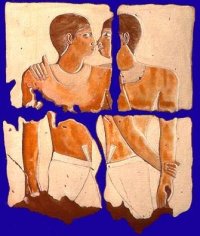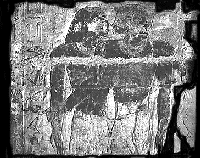
In 1964 in the ancient necropolis of Saqqara, Egyptian archaeologist
Mounir Basta discovered a series of rock-cut passages in the escarpment
facing the causeway to the pyramid of Anas. Crawling on his knees through
the passages Basta came uopn an Old Kingdom offering chamber. He was impressed
with it's unique scenes of two men in an intimate embrace.
Archaeoligists working on the restoration of the causeway dicovered that
some of the stone blocks that had been used to build the causeway had been appropriated
in ancient times from a dismantled mastaba that had origianally served as
the entrance to the tomb. The archaeologists reconstructed the mastaba using the blocks found
in the substructure of the causeway. It was revealed that this tomb had been
built for two men cohabit and that both shared identical titles in the
palace of King Niuserre of the Fifth Dynasty: "OVERSEER OF THE
MANICURISTS IN THE PALACE OF THE KING."
At the entrance of the tomb carved into the rock the names of
Niankhkhnum and Khnumhotep are inscribed as one name over the doorway.
The name Niankhkhnum translated as "joined to life." The name Khnumhotep
translated as "join to hotep." a word meaning peace or satisfaction
and is often used to desribe the bessed state of the dead. The whole name,
as a play on words, may be translated as "joined to life and joined in
death" and obviously has reference to the closeness of the two and their
desire to remain together in this life and the next. We do not know at what
point in their lives they assumed these names.

On the eastern wall of the offering chamber, the identical pair are shown
in the most imtimate embrace within the canons of ancient Egyptian art.
Text taken from:
http://www.egyptology.com/niankhkhnum_khnumhotep/
- words and pictures are by Greg Reeder - Copyrighted Greg Reeder 1999
Offers a really nice tour of this tomb, check it out!

